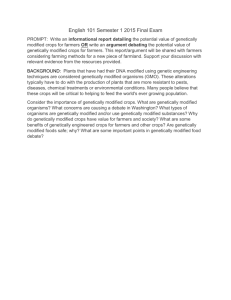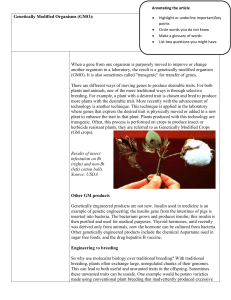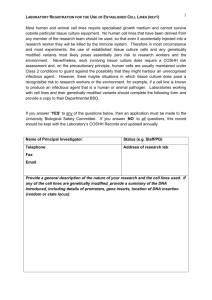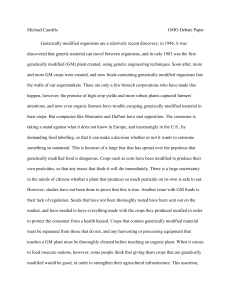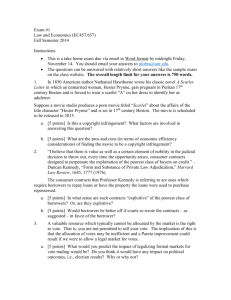Brussels, September 1st, 2005 Mr Aleksander Kwasniewski
advertisement
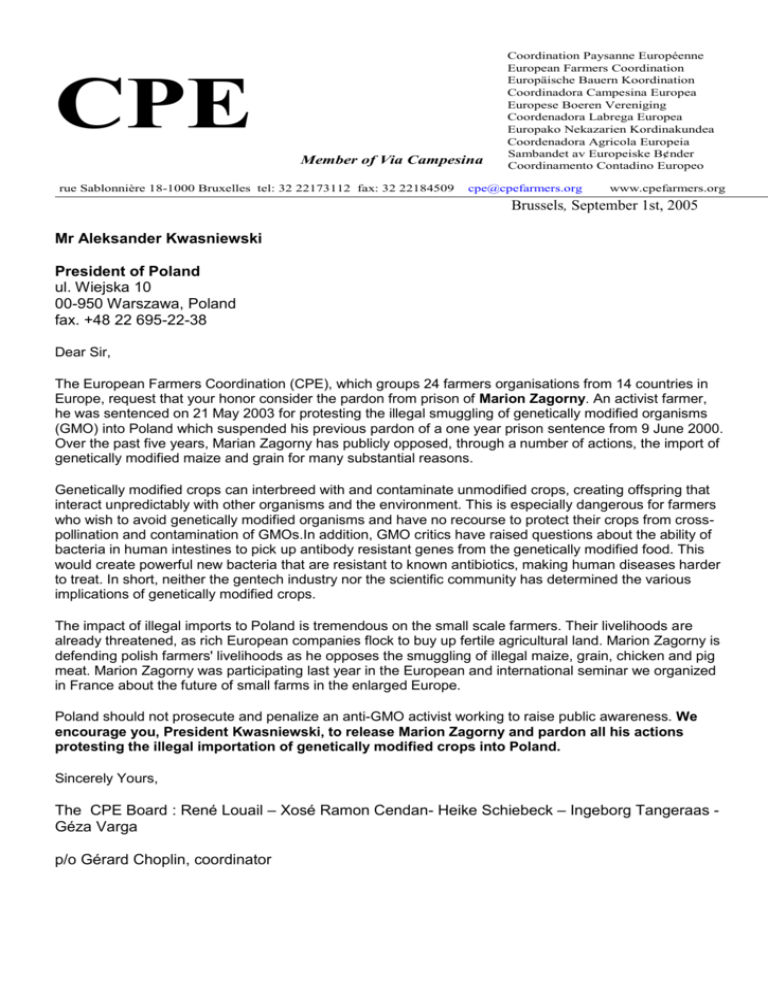
CPE Member of Via Campesina rue Sablonnière 18-1000 Bruxelles tel: 32 22173112 fax: 32 22184509 Coordination Paysanne Européenne European Farmers Coordination Europäische Bauern Koordination Coordinadora Campesina Europea Europese Boeren Vereniging Coordenadora Labrega Europea Europako Nekazarien Kordinakundea Coordenadora Agricola Europeia Sambandet av Europeiske B¢nder Coordinamento Contadino Europeo cpe@cpefarmers.org www.cpefarmers.org Brussels, September 1st, 2005 Mr Aleksander Kwasniewski President of Poland ul. Wiejska 10 00-950 Warszawa, Poland fax. +48 22 695-22-38 Dear Sir, The European Farmers Coordination (CPE), which groups 24 farmers organisations from 14 countries in Europe, request that your honor consider the pardon from prison of Marion Zagorny. An activist farmer, he was sentenced on 21 May 2003 for protesting the illegal smuggling of genetically modified organisms (GMO) into Poland which suspended his previous pardon of a one year prison sentence from 9 June 2000. Over the past five years, Marian Zagorny has publicly opposed, through a number of actions, the import of genetically modified maize and grain for many substantial reasons. Genetically modified crops can interbreed with and contaminate unmodified crops, creating offspring that interact unpredictably with other organisms and the environment. This is especially dangerous for farmers who wish to avoid genetically modified organisms and have no recourse to protect their crops from crosspollination and contamination of GMOs.In addition, GMO critics have raised questions about the ability of bacteria in human intestines to pick up antibody resistant genes from the genetically modified food. This would create powerful new bacteria that are resistant to known antibiotics, making human diseases harder to treat. In short, neither the gentech industry nor the scientific community has determined the various implications of genetically modified crops. The impact of illegal imports to Poland is tremendous on the small scale farmers. Their livelihoods are already threatened, as rich European companies flock to buy up fertile agricultural land. Marion Zagorny is defending polish farmers' livelihoods as he opposes the smuggling of illegal maize, grain, chicken and pig meat. Marion Zagorny was participating last year in the European and international seminar we organized in France about the future of small farms in the enlarged Europe. Poland should not prosecute and penalize an anti-GMO activist working to raise public awareness. We encourage you, President Kwasniewski, to release Marion Zagorny and pardon all his actions protesting the illegal importation of genetically modified crops into Poland. Sincerely Yours, The CPE Board : René Louail – Xosé Ramon Cendan- Heike Schiebeck – Ingeborg Tangeraas Géza Varga p/o Gérard Choplin, coordinator Prezes Sadu Okregowego Wydzia³ IV Penitencjarny i Nadzoru nad Wykonywaniem Orzeczen Karnych 58-500 Jelenia Gora, ul. Wojska Polskiego 56 Poland Dear Sir, The European Farmers Coordination (CPE), which groups 24 farmers organisations from 14 countries in Europe, request that your honor consider the pardon from prison of Marion Zagorny. An activist farmer, he was sentenced on 21 May 2003 for protesting the illegal smuggling of genetically modified organisms (GMO) into Poland which suspended his previous pardon of a one year prison sentence from 9 June 2000. Over the past five years, Marian Zagorny has publicly opposed, through a number of actions, the import of genetically modified maize and grain for many substantial reasons. Genetically modified crops can interbreed with and contaminate unmodified crops, creating offspring that interact unpredictably with other organisms and the environment. This is especially dangerous for farmers who wish to avoid genetically modified organisms and have no recourse to protect their crops from crosspollination and contamination of GMOs.In addition, GMO critics have raised questions about the ability of bacteria in human intestines to pick up antibody resistant genes from the genetically modified food. This would create powerful new bacteria that are resistant to known antibiotics, making human diseases harder to treat. In short, neither the gentech industry nor the scientific community has determined the various implications of genetically modified crops. The impact of illegal imports to Poland is tremendous on the small scale farmers. Their livelihoods are already threatened, as rich European companies flock to buy up fertile agricultural land. Marion Zagorny is defending polish farmers' livelihoods as he opposes the smuggling of illegal maize, grain, chicken and pig meat. Marion Zagorny was participating last year in the European and international seminar we organized in France about the future of small farms in the enlarged Europe. Poland should not prosecute and penalize an anti-GMO activist working to raise public awareness. We encourage you to release Marion Zagorny and pardon all his actions protesting the illegal importation of genetically modified crops into Poland. Sincerely Yours, The CPE Board : René Louail – Xosé Ramon Cendan- Heike Schiebeck – Ingeborg Tangeraas Géza Varga p/o Gérard Choplin, coordinator Minister Sprawiedliwosci Prokurator Generalny RP Andrzej Kalwas Ministerstwo Sprawiedliwosci Al. Ujazdowskie 11, 00-950 Warszawa Poland Fax +48 22 621 30 95 Dear Sir, The European Farmers Coordination (CPE), which groups 24 farmers organisations from 14 countries in Europe, request that your honor consider the pardon from prison of Marion Zagorny. An activist farmer, he was sentenced on 21 May 2003 for protesting the illegal smuggling of genetically modified organisms (GMO) into Poland which suspended his previous pardon of a one year prison sentence from 9 June 2000. Over the past five years, Marian Zagorny has publicly opposed, through a number of actions, the import of genetically modified maize and grain for many substantial reasons. Genetically modified crops can interbreed with and contaminate unmodified crops, creating offspring that interact unpredictably with other organisms and the environment. This is especially dangerous for farmers who wish to avoid genetically modified organisms and have no recourse to protect their crops from crosspollination and contamination of GMOs.In addition, GMO critics have raised questions about the ability of bacteria in human intestines to pick up antibody resistant genes from the genetically modified food. This would create powerful new bacteria that are resistant to known antibiotics, making human diseases harder to treat. In short, neither the gentech industry nor the scientific community has determined the various implications of genetically modified crops. The impact of illegal imports to Poland is tremendous on the small scale farmers. Their livelihoods are already threatened, as rich European companies flock to buy up fertile agricultural land. Marion Zagorny is defending polish farmers' livelihoods as he opposes the smuggling of illegal maize, grain, chicken and pig meat. Marion Zagorny was participating last year in the European and international seminar we organized in France about the future of small farms in the enlarged Europe. Poland should not prosecute and penalize an anti-GMO activist working to raise public awareness. We encourage you to release Marion Zagorny and pardon all his actions protesting the illegal importation of genetically modified crops into Poland. Sincerely Yours, The CPE Board : René Louail – Xosé Ramon Cendan- Heike Schiebeck – Ingeborg Tangeraas Géza Varga p/o Gérard Choplin, coordinator
